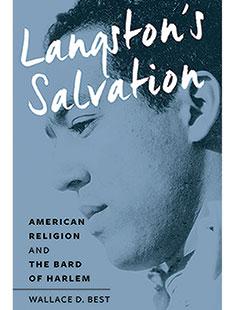Langston Hughes penned some of the nation’s most cherished poetry, such as “I, too, sing America” and “What happens to a dream deferred?/Does it dry up/like a raisin in the sun?” One of the nation’s most prominent African American authors, Hughes was known for wrestling with issues of race as well as for sparking controversy with his writing on religion. In Langston’s Salvation: American Religion and the Bard of Harlem (NYU Press), Professor Wallace Best explores Hughes’ complex — and sometimes overlooked — relationship with religion.
Hughes “made it clear he was a member of no church. He was staunchly opposed to religious institutions,” says Best, a professor of religion and African American studies. But, Best asserts, Hughes embraced “an intense engagement with notions of religion, such as salvation, redemption, sin, and atonement. People routinely asked him, ‘Are you a Christian?’ and he would never answer. But he modeled a way to act religiously in the world on one’s own terms.”
One of his most famous poems, 1932’s “Goodbye Christ,” created immediate controversy by seeming to proclaim Hughes’ atheism. But, Best contends, Hughes may have used the term “Christ” as a metaphor for America’s churches, of which he was highly critical. More than 20 years later, the poem — written while Hughes was visiting Russia — got him hauled before Sen. Joseph McCarthy’s investigation into communists.
With his play Black Nativity, Hughes again produced a religious-themed work, this time a retelling of the story of Mary and Joseph with an all-black cast. The play’s concept “sprang from Hughes’ ability to think expansively, creatively, and even subversively about religion,” Best writes. The play, which was performed on Broadway, has since become a Christmas staple in black churches throughout the United States.
The religious themes in Hughes’ work — as well as his novels, plays, poetry, and social activism — were explored on campus in November when about 250 scholars, students, poets, and fans attended a conference on Hughes’ legacy. The final night included a reading of Hughes’ essay “The Negro and the Racial Mountain”; a performance of blues and jazz music by students; and a reading by creative writing professor Tracy K. Smith, the U.S. poet laureate.
Best is collaborating with several professors, many of whom attended the conference, on a documentary film project, I, Too, Sing America, to be released in 2020. The film, says Best, will “showcase Hughes’ extraordinary talent as a writer.”
Video: An excerpt from the documentary I, Too, Sing America


